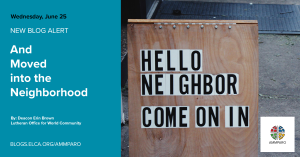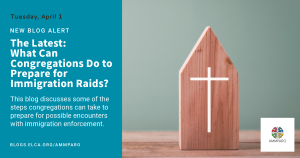And Moved into the Neighborhood
By: Deacon Erin Brown – Lutheran Office for World Community
The Word became flesh and blood, and moved into the neighborhood
(John 1:14)
This verse from Saint John’s gospel, particularly The Message translation, has consistently been on my heart over the past few weeks. As people of faith, I believe we have a lot to share about what it means to be a loving neighbor, especially in light of the recent immigration executive orders.
As a Christian people, we give witness to the fact that God, through whom the world was created, became a human, traveled to this world, and moved in as a neighbor. And when the Divine becomes flesh and blood and moves in as our neighbor, that movement is not done from a place of privilege but of humility. God enters this world as an infant in danger of political persecution. God enters this world and enters into a family that is forced to migrate for physical safety.
The Word moved into the neighborhood. The various realities and circumstances of our continent, our hemisphere, our world, have forced many of our siblings to move. Our siblings are beloved friends and neighbors in our cities, communities, and congregations. And our call, as people of faith, is to welcome, accompany, and support our neighbors with love, compassion, and dignity.
In the midst of so much news revolving around immigration, I can’t help but think of my trip to the southern border last spring. In April of last year, I had the opportunity to accompany a group of young adults on a border immersion trip hosted by the ELCA and Global Refuge. During the trip, we met with humanitarian organizations, border officials, and community leaders in Las Cruces, New Mexico, and El Paso, Texas, learning more about the realities in the borderlands. During the trip, we visited hospitality centers, U.S. District Courts, Port of Entry Offices, and the U.S.-Mexico border. The immersion trip informed young adults about the realities of individuals migrating and posed questions about what it means to walk with and welcome our neighbor.
And in this current moment, welcoming our neighbor means speaking out against rhetoric that dehumanizes and demonizes anyone made in the image of God. Presiding Bishop Eaton, in her statement on immigration executive orders, writes, “As a sanctuary denomination, the ELCA proclaims walking with immigrants as a matter of faithfulness.”
As Christians, we believe that all people are made in the image and likeness of God. And when God moves into the neighborhood, God does so in many forms– as a mother seeking refuge with her children, as a working professional seeking new opportunities, as a child reuniting with family. Leviticus reminds us that we must treat our neighbors not as foreigners, but as an integral part of the community we all form together. We must show love and empathy and remind ourselves that we were also once strangers in Egypt.
While news around migration is being hyper-sensationalized, it can be easy to feel overwhelmed, confused, or incapable of making change. But your loving voice makes a difference, and there are ways you can get involved. AMMPARO Migrant Ministry has a wealth of resources you can use to continue to show love, support, and take action on behalf of our neighbors.
Questions for Reflection:
- How are we greeting our new neighbors, and how does Jesus invite us to welcome him through all of those who are settling in?
- How are you called? How will you bear the light of Christ to your neighbor?
- How are we called to welcome the stranger into our community as if they were born among us?



 With three traveling companions, we were nearing the end of a long drive from Santo Domingo (the capital of the Dominican Republic) to Dajabon on the Dominican border with Haiti. Our trip had been marked by delays: the morning rush-hour traffic as we left Santo Domingo, a major traffic tie-up at a toll booth where the electronic payment system was down, a herd of cows blocking the highway.
With three traveling companions, we were nearing the end of a long drive from Santo Domingo (the capital of the Dominican Republic) to Dajabon on the Dominican border with Haiti. Our trip had been marked by delays: the morning rush-hour traffic as we left Santo Domingo, a major traffic tie-up at a toll booth where the electronic payment system was down, a herd of cows blocking the highway.